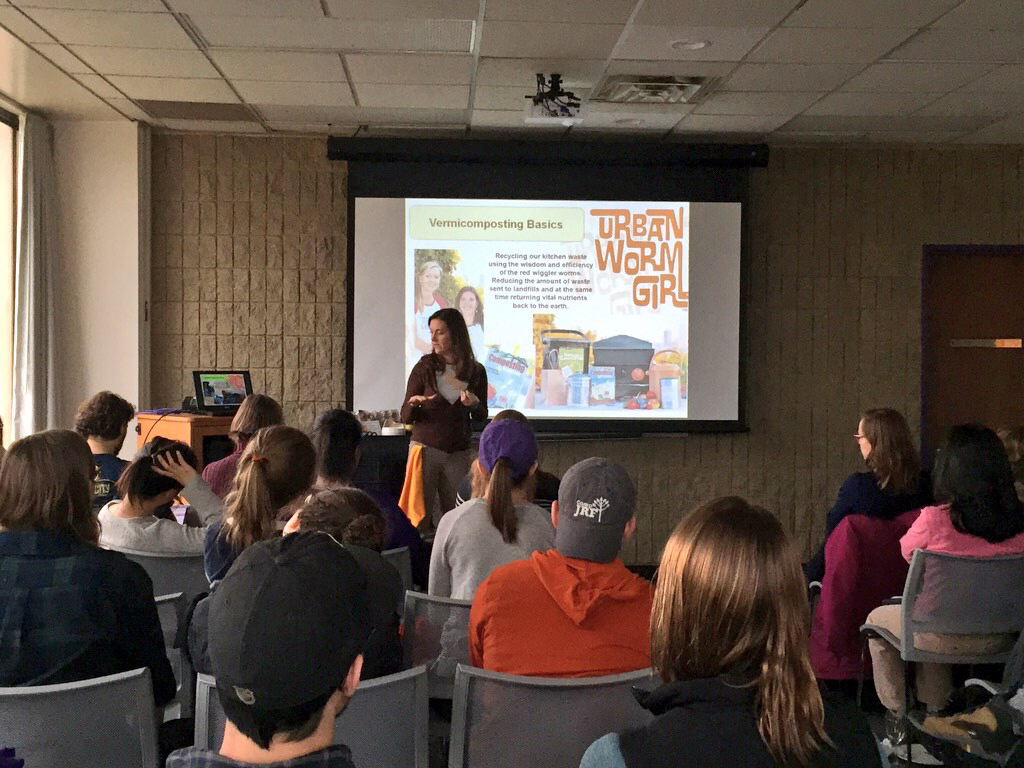Students learn about food waste at Composting 101 Event
The mantra “reduce, reuse, recycle” may be a little outdated now. Composting is quickly becoming the new thing, and it’s already taking place on campus.
On Saturday, Associated Student Government Sustainability Committee, NU Sustainable Food Talks, and Northwestern Eco Reps hosted Composting 101, a panel and discussion about composting for students to learn more about recycling food waste.
The panel included speakers from Collective Resource, Urban Worm Girl, NU WildRoots, and Northwestern’s Office of Sustainability. Each speaker presented a different method for how to get involved with composting, but they all had the same message: it is important to stay educated about the topic.
“We do compost on campus, and I feel that it’s not as well known as it should be,” said Allison Potteiger, the communications coordinator at the Office of Sustainability, and one of the event organizers. “This event [shares] that we’re actually doing really great things with composting.”
The program started with how Northwestern composts, in WildRoots and dining halls, then extended to how students can get involved off campus. Julie Cahillane from the Office of Sustainability explained that all dining halls and cafes have been composting food scraps for almost two years, but that this is pretty much an unknown fact to the student body.
Cahillane said that while it’s important to compost and recycle, these actions aren’t as important as reducing waste itself. She encouraged attendees to first waste less, and then use composting for anything left over.
The main target for the event was off-campus students. “We wanted to make sure that off-campus students knew there’s a bunch of resources within the Chicagoland area,” Potteiger said. Two Chicago-based services, Collective Resource and Urban Worm Girl, presented ways off-campus students can treat their food waste.
Erlene Howard from Collective Resource, a door-to-door food scrap collection company, expressed the importance of not throwing food waste away.
“When we landfill, our food scraps create pollution” said Howard, owner of the company. “When you stuff them underground in the landfill, they start to ferment and fester and create methane and CO2. So when we naturally compost them, at a compost site, they don’t create any pollution."
Howard’s business works with about 300 clients in the Chicagoland area, 100 of which are from Evanston, and several off-campus Northwestern students.
Urban Worm Girl wrapped up the event with a less conventional method of recycling food waste: using worms.
Worm composting, or vermicomposting, includes red wiggler worms eating away food scraps, which produces dirt-like feces that can be used as fertilizer. Presenter Amber Gribben walked around the room encouraging attendees to smell a bin of what she called “worm poop,” and said that its lack of odor is what makes it attractive to students living in apartments.
“[It] is a nice option for people who may not have an outdoor space in which you can do a more typical backyard thermophilic composting,” said Gribben.
At the end of the event, four lucky students won vermicomposting bins for their use at home, while two won a month of Collective Resource pickups. Gribben and Howard also encouraged students who didn’t win the raffle to get involved by buying their own bins or signing up for composting pickups.
[fbshare type="button"] [twitter style="horizontal" float="left"]


